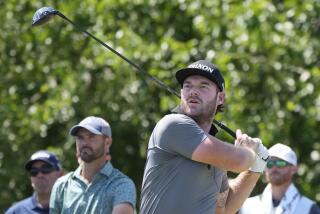Murphy Beats Pain on the Way Back Up : Golf: Treatment keeps his arthritis at bay, allowing him to return to stardom--this time as the senior tour’s top rookie.
- Share via
For many years, Bob Murphy was among the best at beating a golf course. Lately, he has been having the same success in a more serious matter.
Murphy was forced to abandon the regular PGA Tour in January of 1989 when his arthritis became so bad he couldn’t grip a golf club. But he is a glib, knowledgeable player and found a job as a TV commentator on ESPN for the senior tour.
Murphy suffers from a type of arthritis known as psoriatic. A unique, not universally accepted treatment, has put his disease in remission and sent Murphy back to his first love--golf.
Murphy, who turned 50 on Valentine’s Day, didn’t merely join the senior tour; he has become the rookie of the year, won two tournaments and earned nearly $700,000.
Murphy, not sure how his arthritis would stand up under a full schedule, combined playing and TV commentating in the early months of the tour.
A couple of near misses and the lack of pain in his hands convinced Murphy to give up TV.
Finally, in the tour event at Birmingham, Ala., in late August, Murphy broke through with a 13-under 203 for 54 holes, finishing with three consecutive birdies to win the tournament and $127,500. In 21 years on the regular tour, Murphy won more than $127,500 in a season only once--in 1986, when he won the Canadian Open.
As he accepted the trophy at Birmingham, Murphy broke down and cried. He remembered the pain of his arthritis and the fear he would never again play the game he loves.
Murphy came right back to win the GTE North at Indianapolis two weeks later. He will be after his third victory in the Ralphs Classic at Rancho Park beginning Friday. Although Raymond Floyd will not be there to defend his championship, most of the top players will be there, including leading money winner Dave Stockton, Lee Trevino and a rejuvenated Arnold Palmer.
There are only two more tournaments after Rancho, but no matter what happens, Murphy has already had a tremendous first year.
“I wanted to win a tournament,” Murphy said. “Then, I wanted to finish in the top 10, and I have a chance to do that. But first and foremost, I wanted to stay healthy.”
Murphy said he is free of pain, that the treatment he is undergoing under the care of the National Hospital for Arthritis at Arlington, Va., is working.
“At National, they treat arthritis differently than most doctors do,” Murphy said. “They believe arthritis is caused by an infection. They give me antibiotics intravenously and I also take a drug--methotrixate, which has been used for cancer. This is not some new idea. Incidentally, this same group was treating Arnold Palmer’s mother the same way 50 years ago. They emphasize that it doesn’t work on everyone.
“I get 10 to 15 letters every day from arthritis sufferers wanting to know how I managed. I tell them it doesn’t work for everyone, but it does for me.
“The methotrixate was used in chemotherapy. While it didn’t do much for the cancer, doctors noticed that it did help those with psoriasis. It also works with that type of arthritis.”
Murphy’s problems with the disease began in 1987 after he had his best year, earning $186,000. The pain became gradually worse until he couldn’t grip a club.
“I really thought that was the end,” Murphy said. “But the treatments helped. I began to have periods when I could swing a club without pain. I began to prepare for the day I would reach 50. Last year I played in four events on the regular tour and didn’t make the cut once.
“So, I wasn’t too confident when I started out in February. That’s why I kept the TV job, too. But gradually, I began to improve. I can’t play for a few days after a treatment, but otherwise, I’m pretty good. When there was no pain in July, August or September, I decided I was a full-time golfer again.”
Before winning, Murphy threatened several times. At Boston in early August, “I had a lead in the final round, but I kept blowing the easy, short putts and wound up second. I felt sure it was only a matter of time before I won.
“(In Birmingham) on the final round I lipped out a two-footer on the 11th, but finished like a winner. It seems like I can’t play a round without missing an easy one. But my putting has gotten better, and I feel I can win any time out.”
More to Read
Go beyond the scoreboard
Get the latest on L.A.'s teams in the daily Sports Report newsletter.
You may occasionally receive promotional content from the Los Angeles Times.










